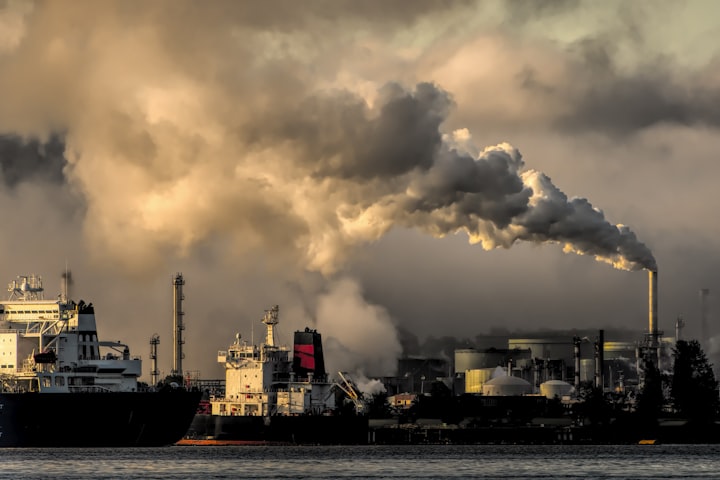What is global warming and its causes and effects?
Environments | Global warming | Pollution

Global warming is the long-term warming of the planet due to increasing levels of greenhouse gases in the atmosphere. These gases, such as carbon dioxide, methane, and water vapour, trap heat from the sun and make the Earth's surface warmer.
Click here how you will stay always fit and fine.
The main cause of global warming is the burning of fossil fuels such as coal, oil, and gas, which releases large amounts of carbon dioxide into the atmosphere. Deforestation and other land use changes also contribute to the increase in greenhouse gases.
The effects of global warming on human health can be significant. Warmer temperatures can lead to more heat stroke, more frequent and severe heat waves, and an increased risk of certain infectious diseases. Global warming can also lead to more air pollution, which can have negative effects on respiratory health. In addition, rising sea levels due to melting ice caps caused by global warming can lead to the displacement of communities and an increased risk of flooding.
Global warming is happening because the levels of greenhouse gases in the Earth's atmosphere are increasing. Greenhouse gases, such as carbon dioxide, methane, and water vapour, trap heat from the sun and make the Earth's surface warmer.
The main cause of the increase in greenhouse gases is the burning of fossil fuels such as coal, oil, and gas. These fuels release large amounts of carbon dioxide when they are burned, and this carbon dioxide is released into the atmosphere, where it contributes to the greenhouse effect.
Deforestation and other land use changes can also contribute to the increase in greenhouse gases. When trees and other vegetation are cut down, they are no longer able to absorb carbon dioxide from the atmosphere. This can lead to higher levels of carbon dioxide in the atmosphere, which contributes to global warming.
Click here how you will stay always fit and fine.
Human activity, therefore, is the main cause of global warming. While there are natural sources of greenhouse gases, such as volcanoes, the levels of greenhouse gases in the atmosphere are increasing at an unprecedented rate due to human activity.
Here are some specific ways in which global warming can affect human health:
Heat-related illnesses: As temperatures rise, the risk of heat stroke, heat exhaustion, and other heat-related illnesses increases. These illnesses can be especially dangerous for older adults, young children, and people with chronic health conditions.
Air pollution: Global warming can lead to an increase in air pollution, as warmer temperatures can cause chemical reactions that create smog and other harmful pollutants. Breathing in polluted air can lead to respiratory problems such as asthma and bronchitis, as well as heart disease.
Vector-borne diseases: Warmer temperatures can lead to the spread of diseases carried by insects such as mosquitoes and ticks. These diseases include malaria, West Nile virus, and Lyme disease.
Waterborne diseases: As the climate becomes warmer, the risk of waterborne diseases such as cholera and typhoid fever may increase. This is because warmer temperatures can lead to the growth of harmful bacteria in water sources.
Mental health issues: The physical and economic impacts of global warming can lead to stress, anxiety, and other mental health problems.
Food insecurity: Extreme weather events such as droughts, floods, and storms, which are likely to become more frequent and severe due to global warming, can disrupt food production and lead to food shortages. This can lead to malnutrition and other health problems.
Displacement: Rising sea levels and extreme weather events can lead to the displacement of communities, which can have negative effects on mental and physical health.
There are several ways to reduce the amount of greenhouse gases in the atmosphere and help to slow down or stop global warming:
Reduce energy consumption: One of the most effective ways to reduce greenhouse gas emissions is to use less energy. This can be done by using energy-efficient appliances, turning off lights and electronics when not in use, and using public transportation or carpooling instead of driving alone.
Use renewable energy sources: Renewable energy sources such as solar, wind, and hydroelectric power produce electricity without emitting greenhouse gases. Switching to renewable energy sources can help to reduce greenhouse gas emissions.
Click here how you will stay always fit and fine.
Plant trees and other vegetation: Trees and other plants absorb carbon dioxide from the atmosphere as they grow. Planting more trees and vegetation can help to reduce the levels of carbon dioxide in the atmosphere and slow down global warming.
Reduce deforestation: Deforestation is a major contributor to the increase in greenhouse gases. Protecting forests and other vegetation can help to reduce greenhouse gas emissions and slow down global warming.
Support politicians and policies that address global warming: Supporting politicians and policies that prioritize reducing greenhouse gas emissions and addressing global warming can help to bring about the changes needed to slow down or stop global warming.
Reduce consumption of meat and dairy products: Livestock farming is a major contributor to greenhouse gas emissions, mainly due to methane emissions from cows and other animals. Reducing consumption of meat and dairy products can help to reduce these emissions.
Support carbon pricing: Carbon pricing is a way of putting a price on carbon dioxide emissions to encourage businesses and individuals to reduce their greenhouse gas emissions. Support for carbon pricing can help to bring about the changes needed to reduce greenhouse gas emissions.
There are several countries that are taking significant action to reduce their greenhouse gas emissions and address global warming.
One example is Sweden, which has set a goal of becoming a fossil fuel-free country by 2045. To achieve this goal, Sweden is increasing its use of renewable energy sources, such as hydroelectric and wind power, and phasing out the use of fossil fuels. The country is also working to increase energy efficiency and reduce energy consumption.
Another country that is taking significant action on global warming is Costa Rica. The country has set a goal of becoming carbon neutral by 2021 and has made significant progress towards this goal. Costa Rica generates more than 90% of its electricity from renewable energy sources, and it has also implemented a number of other measures to reduce greenhouse gas emissions, such as reforestation and conservation programs.
Other countries that are taking significant action on global warming include:
Germany, which is phasing out coal and increasing its use of renewable energy sources.
Click here how you will stay always fit and fine.
Denmark, which gets more than half of its electricity from wind power
Norway, which generates most of its electricity from hydroelectric power
Iceland, which generates almost all of its electricity from renewable energy sources
United Kingdom, which has set a goal of becoming carbon neutral by 2050 and has implemented a number of measures to reduce greenhouse gas emissions, such as increasing the use of renewable energy and improving energy efficiency.
There are many organizations around the world working to address global warming and reduce greenhouse gas emissions. Some examples include:
United Nations Framework Convention on Climate Change (UNFCCC): This is an international treaty signed by almost every country in the world, which aims to stabilize greenhouse gas concentrations in the atmosphere in order to prevent dangerous levels of global warming. The UNFCCC also hosts the annual Conference of the Parties (COP), which brings together world leaders and other stakeholders to discuss and negotiate international agreements on climate change.
International Renewable Energy Agency (IRENA): This is an international organization that promotes the widespread adoption of renewable energy and helps countries transition away from fossil fuels.
Intergovernmental Panel on Climate Change (IPCC): This is a United Nations body that assesses the science related to climate change and provides guidance to policymakers on how to address global warming.
Environmental Defense Fund (EDF): This is a US-based organization that works to protect the environment and reduce greenhouse gas emissions through policy advocacy, research, and other efforts.
Greenpeace: This is an international organization that works to protect the environment and address global warming through campaigning, lobbying, and other forms of advocacy.
There are many other organizations around the world working on global warming and climate change, including government agencies, non-profits, and research institutions.





Comments
There are no comments for this story
Be the first to respond and start the conversation.